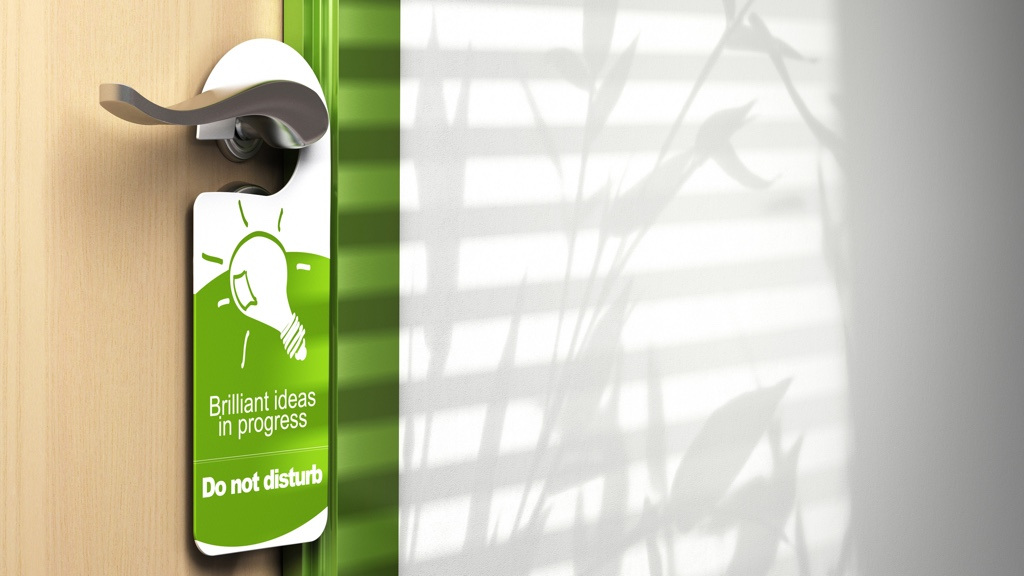Peace and quiet, or constantly interrupted
Datum: 2017-04-24 12:26

I have not yet met the person who never has to work concentrated and undisturbed with some form of task. And neither have I met the one who does not understand that someone else might need to work uninterrupted from time to time.
But I do meet several people every week who have difficulties getting those moments of uninterrupted peace and quiet that are so valuable to us. Thankfully, many of the ”disturbances” are actually things we can influence and do something about.
We can turn the e‑mail notification sound off, as well as the little preview-window that pops up at the top of your screen, which otherwise easily attracts our attention. We can clean away papers and piles from our workspace so that we do not happen to catch a glance of something that could distract us from what we need to focus on at the moment. We can set our phone to ”flight mode”, hence ensuring that we are not disturbed by calls, notifications or the phone vibrating to get our attention.
Colleagues, colleagues, colleagues …
But ”turning off” colleagues is not as easy. One of the most common interruptions is a colleague popping their head through the door. They might have a question, need a signature, need help with something, or want to double-check something. Many people find it difficult to say no when a colleague asks ”Do you have a minute?”, perhaps because sometimes we ourselves are that colleague who needs someone’s help. It is therefore easy to relate to the person disturbing us.
But on the other hand, we are the ones who will suffer the consequences of not prioritizing our tasks and thereby making it take longer to complete them, since every interruption costs us time and concentration.
Everyone is in the same boat
The beauty of that everyone needs time to work undisturbed and that everyone therefore understands this need in others, is that we are all in the same boat and feel the same in this matter. We share a common challenge and can find solutions together.
I cannot say why, but judging from the conversations I have with participants from my courses and lectures, it seems as if we seldom speak to our colleagues concerning how we can make it clear to one another if we are available to answer questions or help colleagues in other ways, or if we need to work undisturbed at the moment.
Talk about it
So, if you have not done so already and you feel the need to make it clear when you need to be left alone, I would recommend you to speak to your colleagues about when to not interrupt one another, perhaps at your weekly meeting, the next department meeting or some other gathering that would be suitable for bringing up the topic.
Do this
- So right now, determine when you will bring up the subject and in which context. If you cannot determine when, ask your closest colleague when he or she thinks it would be a good time.
- Take a few moments to lean back and reflect on the following: ”How can we make it clear to one another if we are available or if we do not want to be disturbed?”. If you bring a few concrete suggestions yourself, it is more likely that you all agree on a solution during the meeting. Examples of the solutions I have heard throughout the years are:
- ”When we have our headphones on or have earplugs, it means that we do not want to be disturbed.”
- ”A closed door means that I need to work uninterrupted.”
- ”If we do not wish to be disturbed, we light the red light in the ”traffic light” outside the door.”
- ”If we have placed a stuffed animal on top of our computer screen, it is a signal that we want to remain undisturbed.”
- ”Everyone has a sign that we have created together which they place on the desk when they do no wish to be interrupted. That way no one has to think of what to say when someone else asks you something.”
- ”We inform our colleagues if we want to work focused for the next hour. If we forget to tell them, it is completely OK to ignore the question, hence signaling that I forgot to inform about needing to concentrate.”
- ”We felt that ”DO NOT DISTURB!” sounds harsh, so we paste a much nicer formulated I‑need-to-work-by-myself-for-a-while-sign on the door to signal that we need alone-time”.
- When it is time for the meeting, bring it up and ask for a creative discussion and brainstorming. I would be surprised if your suggestions are not received with open arms. Discuss and conclude on what you will do from now on. It could be one of the examples described above, or something completely different.
More concentration with greater ease
If you all agree on how to signal in a clear, pleasant and simple manner if you are available or not, you will simply be left to work undisturbed to a greater extent than before. You will even avoid the question if you are available or not, since you have delegated that communication to a sign, an object on your screen or desk, or your headphones. You will be less distracted, be able to concentrate more, and get more things done with greater ease.
What is your signal?
Do you use some other signal? Leave a comment below to share your tip.




